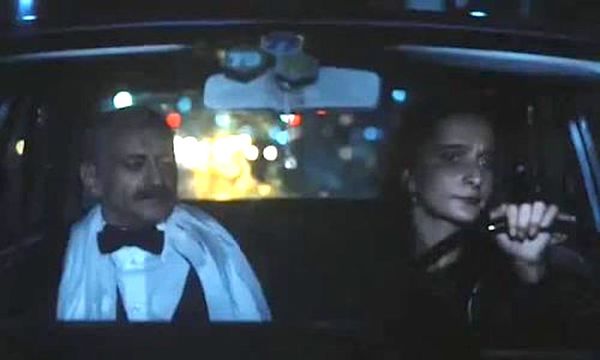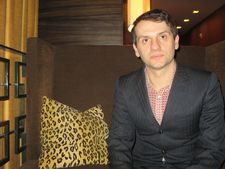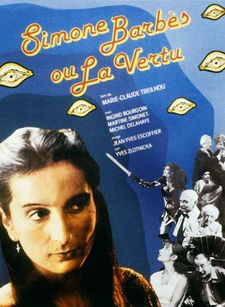 |
| Michel Delahaye and Ingrid Bourgoin in Marie-Claude Treilhou’s Simone Barbès Or Virtue |
At the New York Film Festival in 2020, there were a number of terrific free talks, including Gianfranco Rosi on Notturno (Italy’s Oscar submission); Christian Petzold (Undine, starring European Film Award winner Paula Beer, and Franz Rogowsk) with Heinz Emigholz (The Last City and The Lobby with John Erdman); Steve McQueen with Small Axe cinematographer Shabier Kirchner and his Lovers Rock (Opening Night Gala selection) cast Amarah-Jae St. Aubyn and Micheal Ward; Laura Dern, Joyce Chopra, and Joyce Carol Oates on Smooth Talk (Revivals selection); Chloé Zhao with Nomadland (Centerpiece selection) producer Peter Spears; Dea Kulumbegashvili on Beginning, and Michelle Pfeiffer, Lucas Hedges and Azazel Jacobs on French Exit (Closing Night selection).
 |
| Serge Bozon discussed Simone Barbès Or Virtue with Marie-Claude Treilhou Photo: Anne-Katrin Titze |
Serge Bozon (director of Madame Hyde, starring Isabelle Huppert) was enlisted to moderate a conversation with Marie-Claude Treilhou on Simone Barbès Or Virtue (Simone Barbès Ou La Vertu). The film’s restoration premiered in the Revivals program of the New York Film Festival. During the live Zoom discussion I sent in the following comment and question for Marie-Claude Treilhou.
Anne-Katrin Titze: I love the Volvo ride where Simone (Ingrid Bourgoin) is in control of the interaction with Michel Delahaye. How did you come up with the combination of his silent tears, the revealing of the fake moustache, set to the great choice in music, Gabriel Fauré’s Sérénade Toscane?
Serge Bozon: Another question about something I wanted to talk about. Among the Diagonale (Paul Vecchiali’s production house Les Films Diagonale) actors, there’s one actor, Michel Delahaye, who is a critic, who happens to be in your film in the last scene. Why is the scene so strong? I think the critic (Louis) Skorecki said that in your film each character comes with his or her story. Not a story that you’re going to tell, but the character himself is going to tell.
But when Michel arrives at the end, the story he tells or not, whether it’s one lie or more or not, his story is replaced by the tears and the fake moustache, which is the most obvious sign of an impostor. So an audience member says that she was very moved by the Volvo trip (my childhood car) and how did you manage to have the interaction of the quiet tears, the removal of the moustache, and the serenade?
 |
| Simone Barbès Or Virtue poster |
Marie-Claude Treilhou: Well, in a sense it’s unexplainable. I knew that the serenade would refer to romantic love which is forever lost or at the very least is kind of a phantom presence. As for the moustache, that’s a story that I experienced. As wild or crazy as it may seem, I experienced that and I just put into that context of the film. As for the tears? It’s nothing. I mean, it’s a moment of emotion. You know, he doesn’t want her anymore. He doesn’t want anything. He’s just come back to himself. It’s a moment of loneliness. I don’t know, I really can’t say more than that.
SB: So let’s continue with that scene more specifically. Could you explain, how did you direct this scene? Where was the camera? Where were you? And in particular where Michel Delahaye’s eyes are going (he makes a windshield wiper gesture) which he would do a lot. He also has a kind of lyricism in his way of speaking. He does that, the Sacha Guitry way of speaking, but we have a sense that though he is doing his kind of number which could be great, but we also feel that within that number, his routine, there’s a loneliness that comes up. So suddenly it’s as if he was naked. How did you do that?
MCT: Well, Michel Delahaye was naked because he had no glasses. He was wearing no glasses. Not only that, but he and Ingrid Bourgoin had facing them in front of them the director of photography [Jean-Yves Escoffier of Gus Van Sant’s Good Will Hunting and Leos Carax’s Les Amants Du Pont-Neuf] and his assistant [Gérard Frot-Coutaz] who were standing on a platform that was screwed to the front of the car. They had light beaming into their face and she was really driving.
We crossed all of Paris doing that. And I was lying flat on the ground in the backseat with the sound engineer [Yves Zlotnicka] so I couldn’t see anything. You know, there was no video return at that time. So I did it all by ear but also by trusting them.
Talks were organized by Devika Girish and Madeline Whittle, in collaboration with Eugene Hernandez and Dennis Lim.
The 58th New York Film Festival took place from September 17 through October 11, 2020.





















